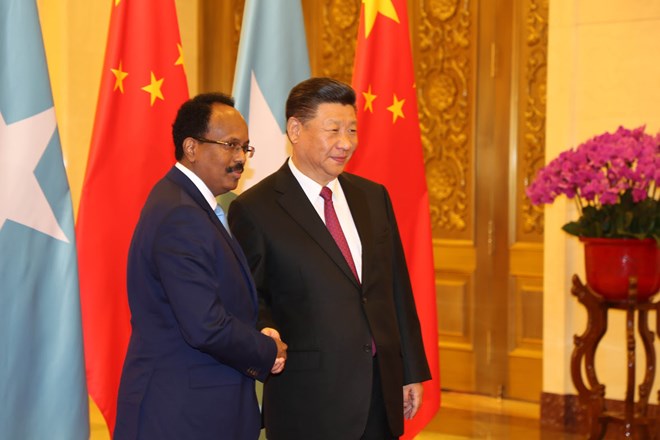Friday September 14, 2018
By Liban Ahmad
By Liban Ahmad

China’s President Xi Jinping and President Mohamed Abdullahi Mohamed of Somalia
Sino-Somali cooperation dates back to 1960s, when Somalia was in its first decade of independence, and China in its second decade of communism under Chairman Mao Zedong. The National Theatre in Mogadishu built by Chinese engineers during the 1960s is still a symbol of this cooperation. After the Somali military coup of 1969 China carried out several landmark projects such as the Mogadishu Stadium, Banadir Hospital for Children and several infrastructure and construction projects. Chinese help for Somalia was then visible to Somalis.
State collapse in Somalia put moratorium on Sino-Somali cooperation. With the second permanent but institutionally weak federal government in power in Somalia, how will the new Sino-Somali cooperation pan out for Somalia and China?
At the Beijing Summit of the Forum on China-Africa Cooperation President Xi Jinping unveiled US $60 billion package made up of US $15 billion interest-free loans, $20 billion credit lines; $10 billion to boost the private sector; $10 billion for development projects and $5 billion special fund for imports from Africa.
advertisements
In the past China and the pre-1991 centralised government of Somalia had strong ties. Somalia now has got a federal government counter-balanced by nascent federal member states. The federal government’s institutions are as weak as they were before the end of the transition in 2012, and yet the government keeps the privilege to sign agreements for which it has no capacity to implement or oversee.The question many Somalis are asking is: Does an institutionally weak federal government deserve to keep the powers to sign agreements or borrow money from foreign countries or multilateral organisations?
Since September 2012, when the Transitional Federal Government came to an end, successive Federal Government of Somalia could not craft a strategy to end reliance on AMISOM, which receives over 90% of funds raised in the name of Somalia.
There is a vicious circle at play in the Somali political arena: the more AMISOM remains in Somali the fewer the opportunities for the federal government to come up with genuine development agenda for a “fragile country”, and the more the Somali political class remains reluctant or unable to create inclusive and accountable institutions, the stronger the case for funding AMISOM at the expense of Somalis remains. In such a situation Somalia will stand a little to gain from the Chinese largesse for Africa. Any FGS dealings with China will likely stoke resentment among Somalis.
Since China described its new package as being ”no-strings-attached”, Somali federal leaders may be tempted to borrow money that will end up in pockets of corrupt politicians.
The Beijing Summit of the Forum on China-Africa Cooperation afforded Somalis an opportunity to critically look at the Federal Government’s status and feeble institutions considering developments and cooperation initiatives it has committed itself to. A transitional federal government would have set itself achievable goals that would pay dividends for people and strengthen accountability modalities. Recognition and the privilege to attend high level meetings outside Somalia will not solve problems posed by weak political institutions and judiciary. It is becoming clearer to many people that the decision to end the transitional federal government was a discernible strategic mistake made by Puntland under Abdirahman Farole in an bid to cut the reign of President Sharif Ahmed and his cohorts short. This decision has exposed shortcomings of federalism: a fully-fledged but institutionally weak governments that sign agreements with foreign countries and multilateral organisations. Federalism in Somalia now as discredited as centralism has been.
Liban Ahmad
[email protected]
The Beijing Summit of the Forum on China-Africa Cooperation afforded Somalis an opportunity to critically look at the Federal Government’s status and feeble institutions considering developments and cooperation initiatives it has committed itself to. A transitional federal government would have set itself achievable goals that would pay dividends for people and strengthen accountability modalities. Recognition and the privilege to attend high level meetings outside Somalia will not solve problems posed by weak political institutions and judiciary. It is becoming clearer to many people that the decision to end the transitional federal government was a discernible strategic mistake made by Puntland under Abdirahman Farole in an bid to cut the reign of President Sharif Ahmed and his cohorts short. This decision has exposed shortcomings of federalism: a fully-fledged but institutionally weak governments that sign agreements with foreign countries and multilateral organisations. Federalism in Somalia now as discredited as centralism has been.
Liban Ahmad
[email protected]